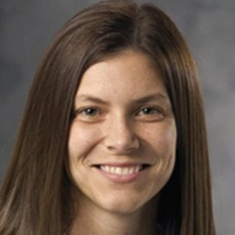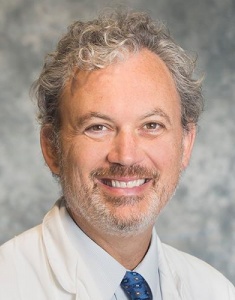Last year, we chronicled the early weeks of the COVID-19 pandemic from the eyes of those on the front lines in the Department of Family Medicine & Community Health. We recently caught up with two of those providers — Debra Whiteheart, MHS, PA-C, assistant medical director at Duke Family Medicine Center, and John Ragsdale, M.D., chief of the Division of Family Medicine and vice chair for clinical services in the Department of Family Medicine & Community Health — to see how things are going one year later.
Providers and staff at Duke Family Medicine Center are working together to find the new normal—whatever that looks like. Debra Whiteheart, MHS, PA-C, notes how everyone has shown so much strength, resilience and perseverance over the past year, trying to keep a positive and upbeat spirit despite the challenging times.

“We’ve come so far. As a department and as a clinic, we’ve really just stepped up since this pandemic started,” Whiteheart says.
The nature of the pandemic allowed the team at Duke Family Medicine Center to try things they’ve wanted to try for a while. And the standard of care has changed, emphasizing creating safe spaces and easy access so patients can continue to receive care, such as via telehealth phone or video visits.
“Everybody’s masked, and all the cleaning processes are much more robust in the rooms now, in all rooms. And that will probably always be,” says John Ragsdale, M.D. “The waiting room is now pretty empty with chairs. It is fairly dystopian-looking with people that are just not facing each other. It just looks weird if you stand back.”
Yet, clinicians are still able to find positive things that came from this year.
Ragsdale appreciates more time with his family, while Whiteheart is grateful for the little things, like teaching medical students in person again.
She says before moving from remote to in-person teaching recently, one of the medical school classes she teaches took a Zoom poll to guess what each person’s height was.
“It was shocking to meet that person and see that they were way taller. We cracked up laughing,” Whiteheart says.
Family life and caring for one’s mental and emotional health

Outside of the clinic, the effects of COVID-19 have reached their families.
“One of the most sobering pieces for me personally was something that I didn’t really think about because we kept working,” Ragsdale says. He says the effect on his family members became apparent at a family dinner in Chapel Hill.
“It hadn’t really landed on me that my kids really hadn’t gone out to dinner in a while. When I took them, they were really not acting right—really worried and quiet,” Ragsdale says. “And I said, ‘You know, no one is sitting around us, we’ll just eat dinner…’ and they were like, ‘No, we’re going to die from COVID,’ and I’m like ‘You’re not. It’s fine.’”
Whiteheart’s mother-in-law contracted COVID-19 and was on a ventilator for four weeks before her family had a difficult decision to give her comfort care.
“So I think for me ..., things just haven’t stopped,” Whiteheart says. “We’ve continued to give care; we’ve continued to get up every morning and report to work and take care of our patients and put them first. And in that process, I don’t know that I’ve taken time for myself to work through some of this.”
Ragsdale encourages providers and staff to take every vacation day they have and to be intentional in caring for their emotional and mental health.
“When I’m covering someone’s inbox ... I really want them to come back to a truly empty inbox,” says Ragsdale. “To give them that gift when they’re back feels good; downtime for people that is truly downtime.”
The future of the pandemic
With K-12 students returning to in-person school, Ragsdale says there is an opportunity to remedy some of the social benchmarks kids missed out on.
“I think it’s really important for their social relationships,” Whiteheart says. “Because I agree, I don’t feel like they’re the patient population that is spreading as much as we had initially thought. So they had a lot to lose.”
Ragsdale is also hopeful about the future of vaccines.
“I think there’s been a quantum shift in how we create and make vaccines,” Ragsdale says. “That this will pour out into improvements around cancer therapy, with more robust and effective vaccines.”
Whiteheart is hopeful that more people will become vaccinated. She is nervous that we will reach a teetering point of 40/60 or even 50/50, where people start to be resistant to wearing masks, causing disruptions in public.
Celebrating successes and teammates
During a challenging year, Whiteheart feels like she is in the right place at the right time.
“I’m just grateful for being a part of this family medicine practice during this worst year ever. I’ve been impressed with everything that we’ve been able to do and continue to do,” Whiteheart says. “It’s been a difficult and challenging year, but I don’t think I’d rather be anywhere else.”
Ragsdale says the Department of Family Medicine & Community Health has made all the difference—to him and to our community—this year. He remembers a group of people who stood up and said that they would get involved in care during the early days of the pandemic, well before it was known what that meant.
“I think about the people who decided, ‘Yeah, I am willing to put my life in this and help continue’,” Ragsdale says. “I will not forget that as long as I live.”
The dedication of the Duke Family Medicine Center team was recognized recently as they received a Duke Presidential Award.
“I’ve never worked with a braver group of people, basically. It’s pretty amazing, honestly,” Ragsdale says. The changes we made worked, and we have verifiable evidence that our positivity rate as a clinic is very low,” Ragsdale says. “I’ve heard in several meetings, ‘Y’all have done a great job.’ So, I am really proud of us, and that feels good.”
Lauren Westbrook is a communications intern with the Department of Family Medicine & Community Health. She is a senior at UNC-Chapel Hill, majoring in public relations.
Special thanks to Caitlin Piccone, MPH, who transcribed the interview.